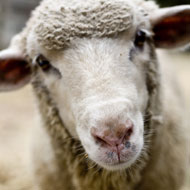
Trial aims to end debate on antibiotics versus trimming
A new trial at a North Yorkshire farm aims to shed light on the best approach for treating lameness in sheep.
Lameness is common on sheep farms and can have a serious impact on productivity.
Lame ewes from the Marrick Abbey Farm in Richmond will undergo a trial to determine whether antibiotics or trimming offer the best treatment. During the six-week trial, half of the ewes will be treated with antibiotics and have their feet trimmed, while the other half will receive only antibiotics.
It is hoped that the trial, run with the help of SAC Consulting (part of Scotland's Rural College (SRUC)), will demonstrate that recovery is faster and more successful using injectable antibiotics only.
SAC Consulting Agriculture Consultant, James Hadwin, explains: "There has been a good deal of research into treating lameness and the advice is not to trim…we expect the trial at Marrick Farm to demonstrate this and we hope local farmers will be interested in the results.”
SRUC say that local farmers will have opportunities to find out about the trial because Marrick Abbey is one of 19 EBLEX "focus farms" taking part in a 12-month campaign to tackle cattle and sheep health and welfare issues. Each farm will hold a series of free events for farmers will take place over the next nine months.
Marrick Abbey's first meeting will take place on Wednesday, August 6 from 4pm to 8pm. As well as a practical session on lameness, which includes details of the new trial, issues of flock bio-security, returning wintering stock and flock fertility will also be discussed.
Farmers who wish to register to attend the free meeting should ring the EBLEX events office on 01904 771211 or email brpevents@eblex.ahdb.org.uk



 The latest
The latest